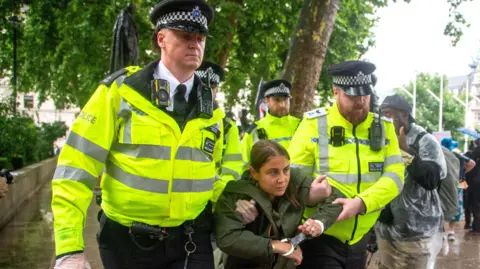**Title: UN Human Rights Chief Condemns UK’s Ban on Palestine Action**
In a recent announcement, Volker Turk, the United Nations’ human rights chief, voiced his strong disapproval of the UK government’s ban on the activist group Palestine Action. Characterizing the imposition as a “disturbing” misuse of counter-terrorism legislation, Turk urged for the immediate lifting of the ban, labeling it “disproportionate and unnecessary.” This condemnation comes after the UK government designated Palestine Action as a prohibited organization under the Terrorism Act of 2000, following the group’s claim responsibility for an incident involving the vandalism of two military aircraft, which reportedly inflicted damages estimated at £7 million.
The controversy surrounding the ban is heightened by the legal challenge currently underway in the High Court, anticipated to conclude by the end of this month. As the debate intensifies, many are questioning the implications of such a ban on civil liberties and the right to free expression.
The ramifications of this ban are severe; supporting or being a member of Palestine Action has become a criminal offense that can incur a penalty of up to 14 years in prison. Since the ban’s enactment, more than 170 individuals have been arrested, illustrating a significant, ongoing crackdown on the organization and those associated with it.
In his statements, Turk expressed concern that the ban restricts the rights of numerous individuals who support Palestine Action but have not engaged in illegal actions themselves. He emphasized that this prohibition seems to infringe upon fundamental rights to freedom of expression, peaceful assembly, and association. Turk argued that the measures taken are incompatible with the UK’s obligations under international human rights law, calling for the government to reconsider its stance.
Amidst this, UK Security Minister Dan Jarvis responded, articulating that expressions of support for Palestinians remain lawful. He clarified that the specific proscription applied only to Palestine Action, labeling the group as having orchestrated campaigns of criminality, including attacks on national security infrastructure. His remarks were aimed at delineating the line between lawful activism and criminality.
The activism led by Palestine Action often focuses on actions against arms companies, a strategy evident since the recent escalation of conflict in Gaza. The group’s notoriety escalated following an incident in July where activists vandalized aircraft at RAF Brize Norton, asserting that these planes were involved in support initiatives for the Israeli military. The UK Parliament enacted the ban following this event, reflecting a governmental response geared toward mitigating what it views as threats to national security.
Moreover, the broader implications of the UK’s definition of terrorism have been scrutinized. Turk criticized the definition for being excessively broad, encompassing actions that involve “serious damage to property.” He argued that according to international standards, acts of terrorism should primarily pertain to violent actions that cause death or serious injury, or acts intended to intimidate populations or compel governmental action. By extending the label of terrorism to property damage, Turk cautioned that it diminishes the gravity of true acts of terror and blurs the lines of criminality established by existing laws.
As discussions continue and the High Court deliberates the legitimacy of the ban, the ongoing tension reflects a significant intersection of human rights, national security, and the imperative for freedom of expression. In such a polarized political climate, the future of Palestine Action hangs in the balance, as do broader questions about civil liberties and the role of activism in modern society. The outcome of the court’s ruling could set a critical precedent affecting not only Palestine Action but the landscape of protest and dissent in the UK moving forward.











